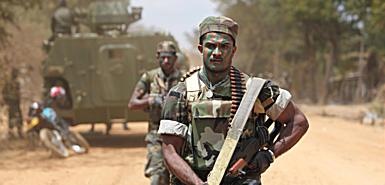 The UN Security Council took up the fighting in Sri Lanka for the first time on Friday as a senior UN official reported that dozens of people, at least, were being killed every day.
The UN Security Council took up the fighting in Sri Lanka for the first time on Friday as a senior UN official reported that dozens of people, at least, were being killed every day.
Council members, meeting in closed session, appealed to the Sri Lankan government to exercise maximum restraint and to the Tamil Tiger rebels, or LTTE, to lay down their arms and abandon the use of violence to pursue their political aims, the council president said.
Sir John Holmes, the UN’s humanitarian coordinator, reported on his recent trip to the island under the agenda item "other matters" after Russia dropped its objections to the Security Council discussing the conflict between government forces and Tamil Tigers.
Sir John said 200,000 civilians were trapped by the fighting, and cited "credible reports" that the Tamil Tigers had shot at some trying to flee. He said he had urged the government to call a temporary halt to hostilities or establish a humanitarian corridor to allow people to leave, if it could be agreed.
"I also urge the Government of Sri Lanka to hold back from any final military battle in order to allow time for the civilian population to get out safely, one way or another," he said.
The briefing followed a behind-the-scenes row over whether the Security Council should discuss Sri Lanka at all.
Britain and other Western nations pushed for the briefing as a way to highlight the heavy civilian casualties.
But Russia, which fears UN intervention in Chechnya, initially argued that the council should not interfere in the "internal affairs" of a UN member state by taking up Sri Lanka. It was backed by council-member Vietnam.
This month’s Japanese presidency of the 15-nation council, which has the power to impose sanctions, reassured Russia that Sri Lanka would not be put on the council’s formal agenda.
The meeting ended with no UN action, but agreement that the Japanese ambassador, Yukio Takasu, could summarise the discussion to the waiting press.
"We share all serious concern about the humanitarian situation in Sri Lanka, particularly in light of the large number of internally displaced persons," he said.
"The nature of the conflict here is very clear. The government of Sri Lanka is struggling against a group of people who are using military offence and sometimes the presence of internally displaced persons for advantage of the military offensive," he said. "Some members mentioned that … LTTE has been considered as a terrorist organisation."
"We understand that the government has been taking certain precautions… but the fact of the matter is that there are still a lot suffering and damages of civilians. "We very much hope that the government continue to exercise maximum restraint and comply with international law and try to avoid the suffering and damage on the civilians."
"Much stronger concern should be placed on the behaviour of the LTTE, Tamil Tigers. We are very much concerned they are not accepting free access to the area," he said.
"I think there is a convergence of views among the members that we should appeal strongly to the LTTE that they lay down their arms and stop the violence in pursuit of their political aims," he said.
Sir John visited Vavinuya, just south of the fighting, where 36,000 refugees have taken shelter, but he was not able enter the area controlled by the LTTE.
The government, he said, had assured him that it wanted to return 80 percent of the refugees to their homes by the end of the year, once de-mining is completed.
Stepping beyond his humanitarian mandate, Sir John also urged the Sri Lankan government to take "the historic opportunity to move swiftly, after the end of the fighting, to tackle underlying political issues, and move to a generally acceptable devolution settlement on a fully democratic basis."
Sir John Sawers, Britain’s UN ambassador, voiced satisfaction that the briefing had taken place.
"We, the United Kingdom and I personally, have been working for some time to ensure that the Security Council gets a full briefing on the situation in Sri Lanka," he said.
(For updates you can share with your friends, follow TNN on Facebook and Twitter )
